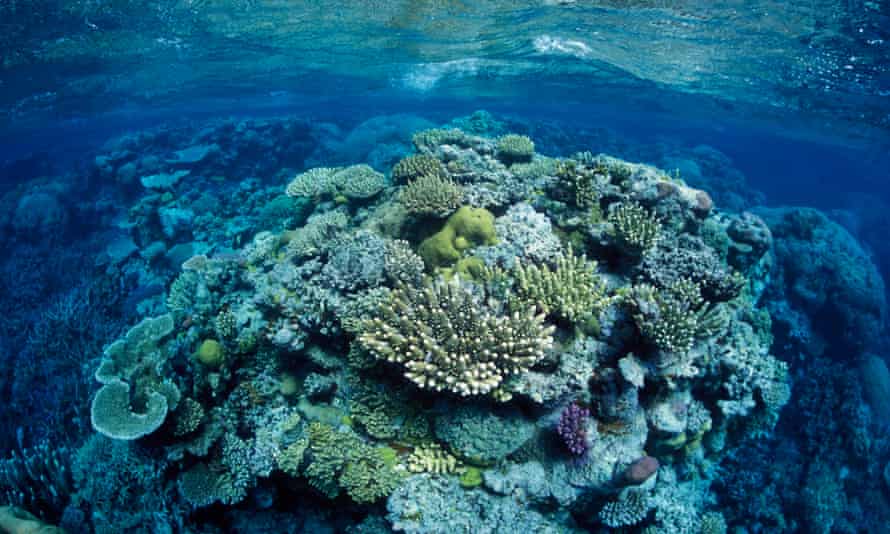Australia to host ambassadors at Great Barrier Reef ahead of ‘in danger’ list vote
Representatives from nine voting nations among guests on snorkelling trip as Morrison government lobbies against Unesco recommendation

First published on Tue 13 Jul 2021 13.30 EDT
Ambassadors from more than a dozen countries will fly to the Great Barrier Reef for a snorkelling trip on Thursday as part of the Morrison government’s lobbying campaign to keep the ocean jewel off the world heritage in danger list.
The government’s official reef ambassador, Warren Entsch, will host the Canberra-based diplomatic group which, he said, included nine countries with voting rights at the upcoming world heritage committee meeting. Entsch said on Wednesday the diplomats were paying their own airfare.
Australia has launched an all-out lobbying offensive against a recommendation from United Nations Educational, Scientific and Cultural Organization (Unesco) to place the reef on the world heritage in danger list.
On Tuesday, Queensland premier Annastacia Palaszczuk wrote to the prime minister, Scott Morrison, asking him to match more than $2bn of funding for renewable energy and water quality projects along the 2,300km reef.
Palaszczuk wrote that new funding commitments would send a “strong signal” to the committee ahead of the meeting, which starts on Friday. A decision on the reef is currently scheduled for 23 July during the virtual meeting.
The federal environment minister, Sussan Ley, is in Europe for a week of meetings to try and convince countries to vote against the “in danger” recommendation.
Unesco says the committee should put the reef on the danger list after rising ocean temperatures caused mass bleaching of corals in 2016, 2017 and 2020. Targets to improve water quality had also not been met, the UN body has said.
Entsch said 16 countries and the European Union had accepted an invitation from the government and would visit Agincourt Reef on a trip from Port Douglas, north of Cairns.
Scientists and officials from the Australian Institute of Marine Science (Aims) and the Great Barrier Reef Marine Park Authority would accompany the ambassadors, Entsch said, as well as tourism figures. Indigenous rangers would also be on board.
“They will cover the whole ambit of the challenges [to the reef], as they should,” he said. “It is critically important that when other countries are out there judging our performance, it’s important their representatives in Australia can travel up and get first hand information.”
Among the countries Entsch said had accepted the invitation were Russia, Bahrain, Hungary, Brazil, Spain and Guatemala – all countries on the 21-member world heritage committee, chaired by China.
Entsch, who would not be going into the water for temporary health reasons, said: “It’s important countries that are voting on this need to be able to say they have put their head under the water and have spoken to world experts. Then they can make their own decision. This is good practice and this is what should be happening.”
Rising ocean temperatures caused by rising greenhouse gas emissions from fossil fuel burning have driven mass bleaching across the reef. Aims has said the reef is showing signs of recovery after benign conditions since the last bleaching event in 2020.
Entsch said Australia alone could not stop coral bleaching, which would need actions from bigger economies including China, India and the United States.
He revealed he had “booked a ticket” for the international climate talks to be held in Glasgow in November.
He feared an “in danger” listing would send a negative signal to scientists and landholders working to improve conditions that there was “no point” in their work.
Ley told a briefing of ambassadors in Canberra last week that Australia wanted Unesco to carry out a monitoring mission on the reef before it made any recommendation about an “in danger” listing.
Unesco has said a monitoring mission is not always required before a recommendation for the list is made. The UN body says the “in danger” list should be seen as a chance to rally the world to the plight of the reef and to encourage action to reduce fossil fuel use.
Queensland’s environment and reef minister, Meaghan Scanlon, told Guardian Australia she was disappointed to only learn of the ambassador trip on Tuesday morning, and said the state government was hoping to be able to be represented.
In a letter to Morrison, Palaszczuk wrote she was “extremely concerned” about the impact on jobs if the 21-country world heritage committee placed the reef on its “in danger” list.
To help avert an “in danger” listing, she said the Morrison government should match her own government’s funding to improve water quality and build more renewable energy.
The letter lists four demands, including federal support to match state funding of $270m for water quality projects and $2bn for renewable energy projects.
Scanlon said the reef had avoided an “in danger” listing in 2015 after the state and federal governments had shown commitments through a joint policy – the Reef 2050 plan. A similar effort was needed now, she said.
That policy is currently being reviewed, and Unesco has said it wants to see a new version that “fully incorporates” recommendations from the reef’s management authority “that accelerated action at all possible levels is required to address the threat from climate change”.
Scanlon said: “Clearly we all want to go to the international community with a united position and we all want to keep the reef off the in danger list.”
“But we have a different view on the scale of ambition to show we are taking the concerns and the science seriously.”
-
This story was updated on 14 July to make clear the diplomats were paying their own airfares to visit the reef